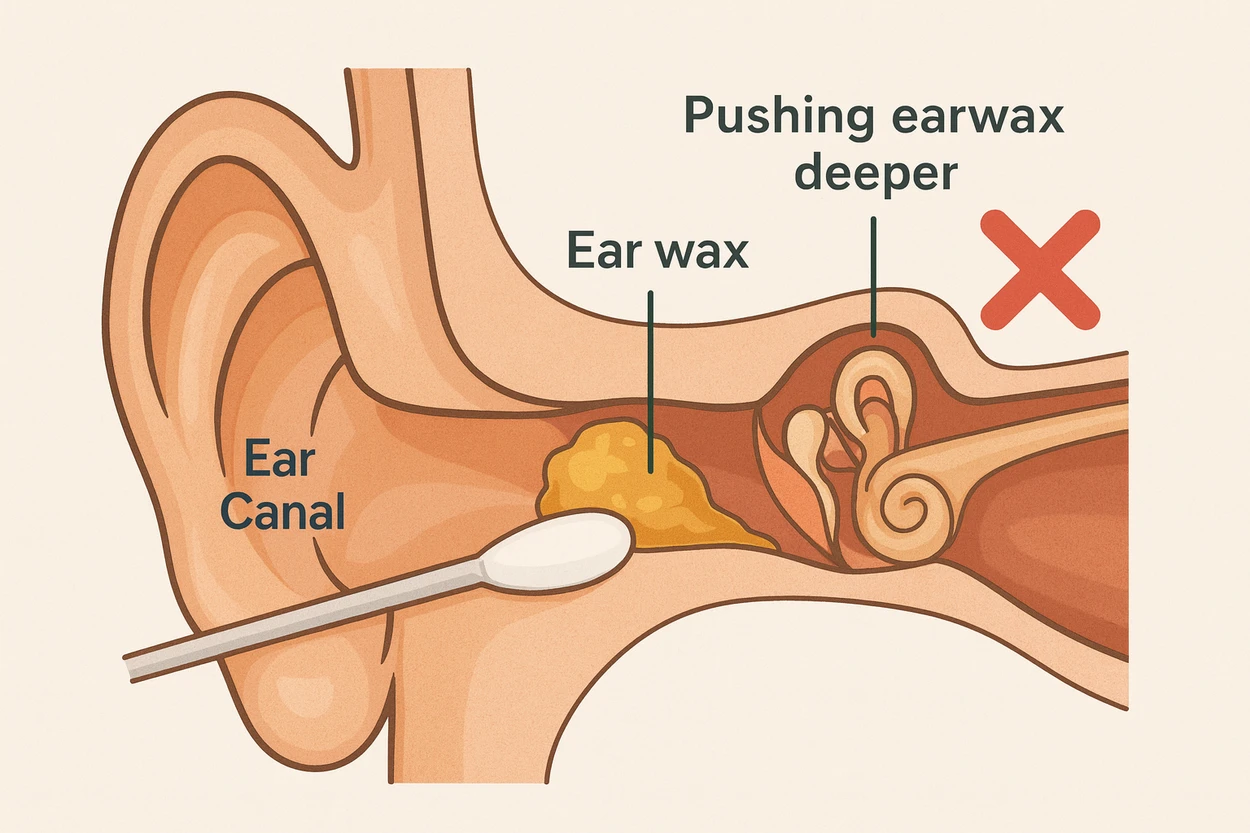How Ear Wax Forms and Why Regular Check Ups Matter

Take a quick quiz
Do You Need an Ear Wax Check?
Have you noticed changes in your hearing?
Ear Wax Basics
Ear wax is a natural substance that helps protect your ear canal. It moisturises the skin and traps dirt or small particles. This keeps your ears safe from possible irritation.
As reported by NHS resources, ear wax is produced by glands in the ear canal. Your body clears this wax on its own, but sometimes it may accumulate over time.
This natural wax guards against infections and debris. It plays a part in keeping your inner ear hydrated. When it builds up, it can lead to reduced hearing or discomfort.
Why Wax Builds Up
Your ears are self cleaning in most cases. Some people produce more wax than others. Using cotton buds or inserting objects pushes the wax deeper, increasing the chance of blockage.

A narrow ear canal can lead to buildup. If your ear canal is smaller, wax might not exit as it should. That makes blockage quite likely in regular daily life.
Frequent ear plug or hearing aid use can cause wax to push inward. This routine pressure packs the wax deeper. Over time, you may need professional help to remove it.
Signs You May Notice
You might sense a feeling of fullness in your ear. Sounds may seem muffled. Occasionally, there could be possible itching or slight pain in the ear canal, suggesting excess wax.
Tinnitus can be a sign as well. This is a ringing or buzzing sensation noticeable during quiet moments. If it persists, it might signal deeper issues related to wax buildup.
Some experience dizziness if the wax presses on the eardrum. This can unsettle your balance. Before symptoms worsen, visit Chatham Pharmacy in Medway for ear evaluation and ear wax removal.
Potential Risks of Excess Wax
Blocked wax can trap water in the ear canal. This may create a moist environment that fosters bacterial growth. In certain cases, that can lead to infection or painful inflammation.
Excess wax that presses against your eardrum might create hearing complications. That is temporary, but daily conversations or group activities become challenging if the buildup remains unaddressed for too long.
When left alone, trapped wax can harden. It becomes difficult to remove without professional assistance. A simple check at Chatham Pharmacy helps detect issues early and supports your ear health.
Earwax Removal Methods
Method | How it Works | |
|---|---|---|
Microsuction | Wax is removed using a microscope and gentle suction | |
Irrigation | Warm water is used to flush wax out | |
Manual removal | Forceps or scoops are used to extract wax | |
Softening drops | Oils or drops soften wax over several days |
When to Seek Help
Visit a professional if symptoms persist or worsen. Pain, hearing changes, or ringing could point to a more serious blockage. Local services in Chatham, Rochester, and Gillingham offer convenient care.
Public Health England recommends seeking qualified help for ear problems. This ensures any condition is identified promptly. Early intervention prevents complications and helps you maintain hearing over the long term.
If you feel unsure, a short visit to Chatham Pharmacy can clarify the cause of your symptoms. Staff can guide you on whether you need an ear wax removal session.
What to Expect During a Check Up
You will be greeted by a team in ear health. They will listen to your concerns. They will assess your ear canal using instruments to see if wax is present.
If excess wax is confirmed, removal methods are used. These might include irrigation or micro suction. Both approaches are recognised and follow strict guidelines from the British Society of Audiology.
An ear check is usually quick. The procedure is painless for most people. Some pressure may be felt, but that subsides. You can resume normal activities right after your visit.
Official Guidelines and Advice
NHS advice states that you should not poke or probe your ears. This can cause damage and push wax further in. Instead, consult a qualified provider if you suspect buildup.
National Institute for Health and Care Excellence suggests ear checks for persistent problems. An evaluation avoids complications later. Medical guidance ensures you receive care, whether you need removal or investigation.
Many experts advise routine checks instead of waiting for obvious signs. Regular visits detect changes early. This prevents bigger interventions and helps keep your hearing very crisp in everyday life.
Benefits of Regular Checks in Medway
Medway residents have easy access to ear care services. Chatham Pharmacy, situated near Rochester and Gillingham, offers attention to spot issues early. Proximity means you can address concerns without waits.
Routine checks also help you learn more about prevention. By scheduling evaluations, you gain insights about cleaning methods and lifestyle factors that could lower the risk of ear wax buildup.
Clear hearing can support your everyday interactions. Early detection of wax issues helps you stay engaged at work or social events. A healthy ear canal boosts your overall confidence, comfort.
Your Next Steps
Spotting signs early can save you from discomfort. If you suspect buildup or have ear concerns, seek guidance. Chatham Pharmacy is ready to help Medway residents with ear wax removal.
Regular ear checks are vital for good hearing and well being. By acting, you minimise complications and safeguard your health. Schedule a check and maintain your ear care all year.
Visit Chatham Pharmacy in Medway to discuss ear wax removal. Advice helps ensure you address issues early. Your hearing matters, take step find clarity in life. Book an appointment now.



